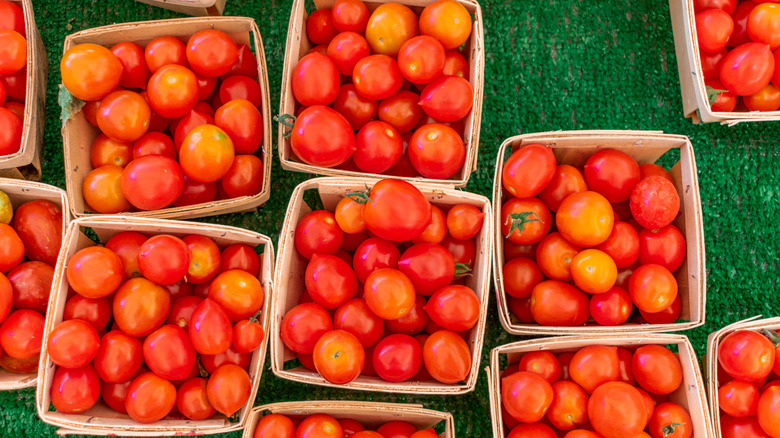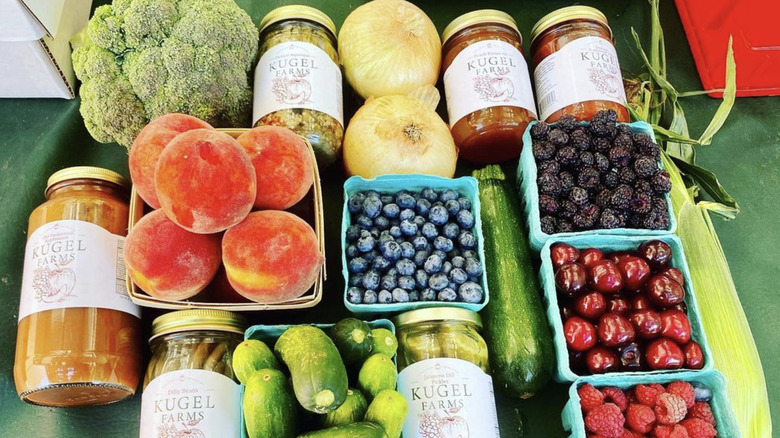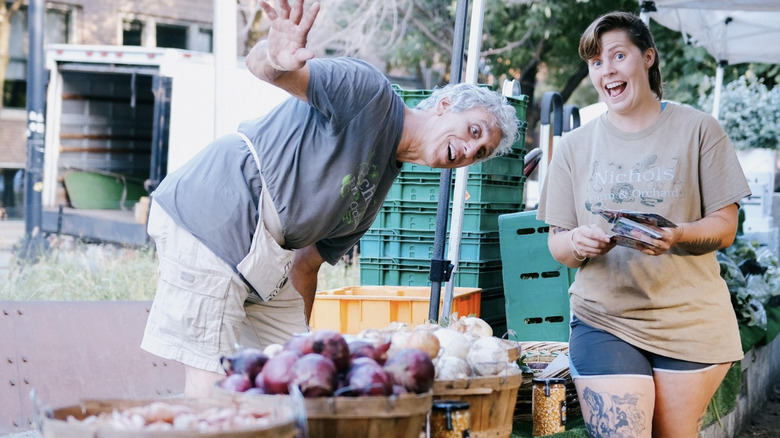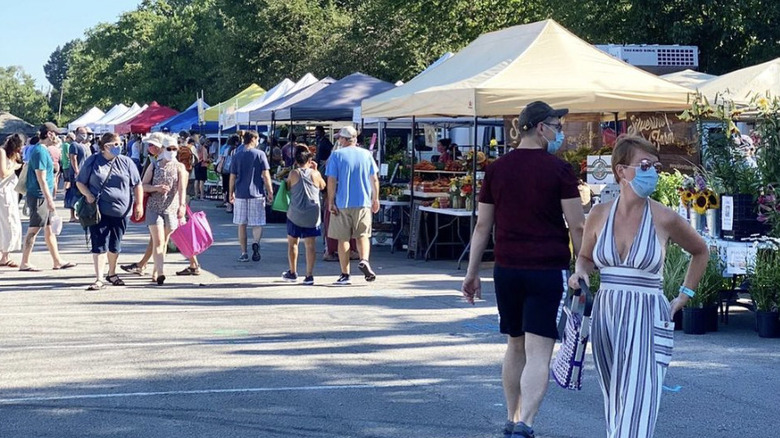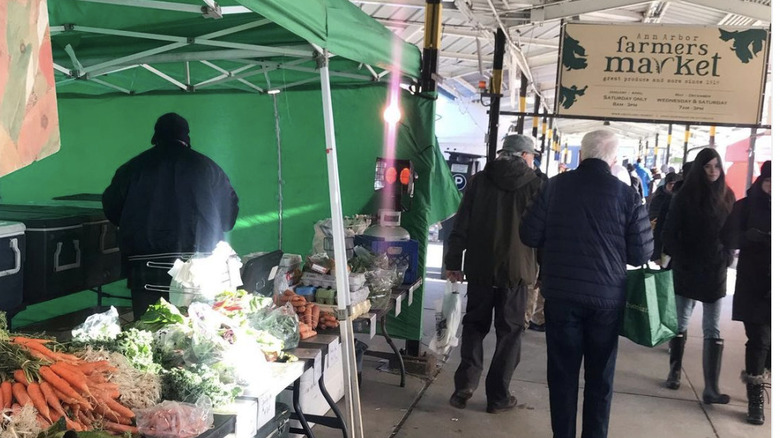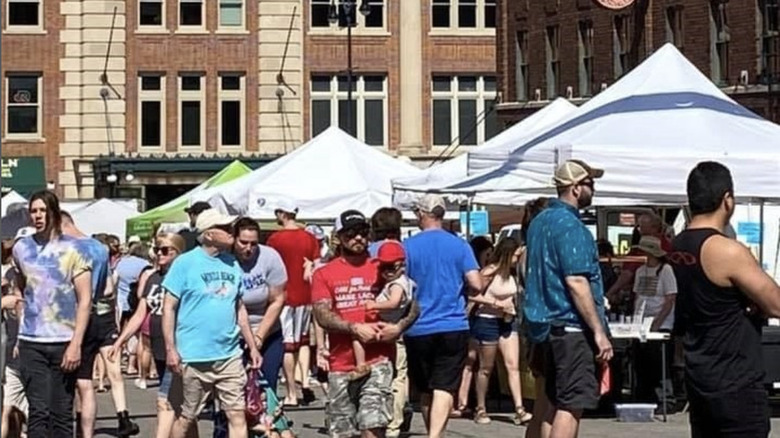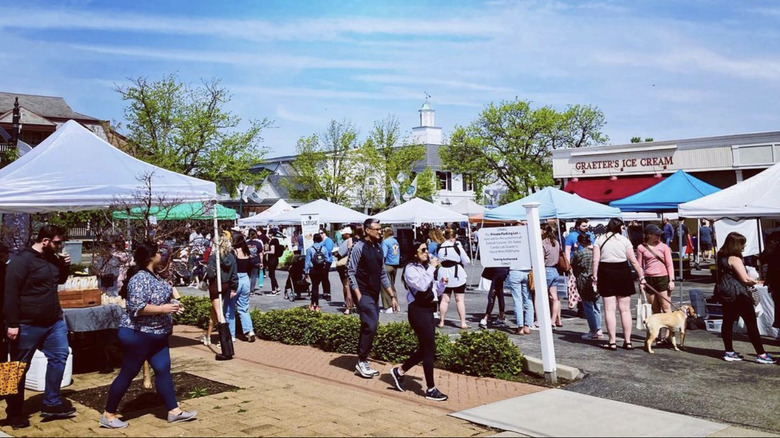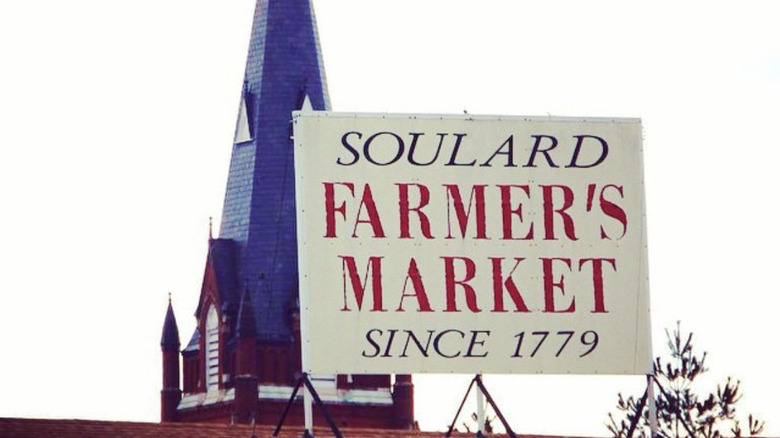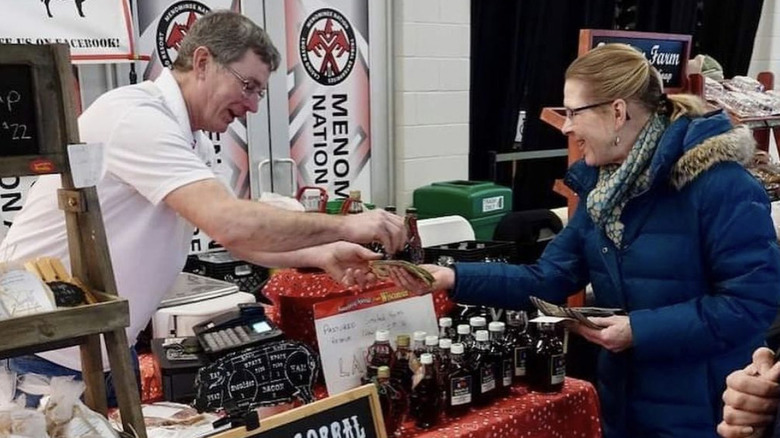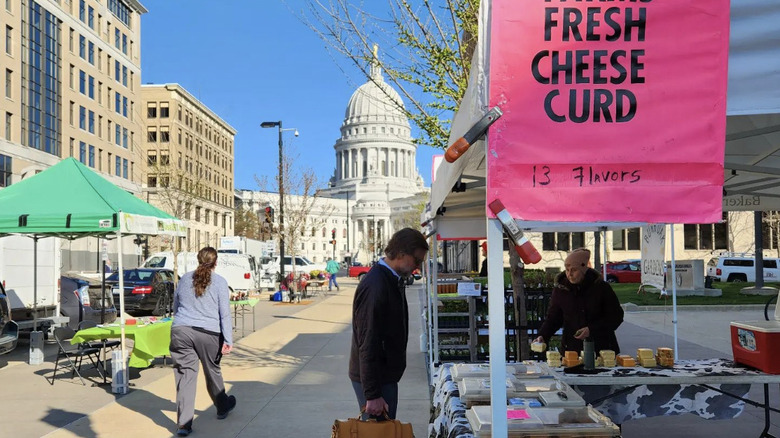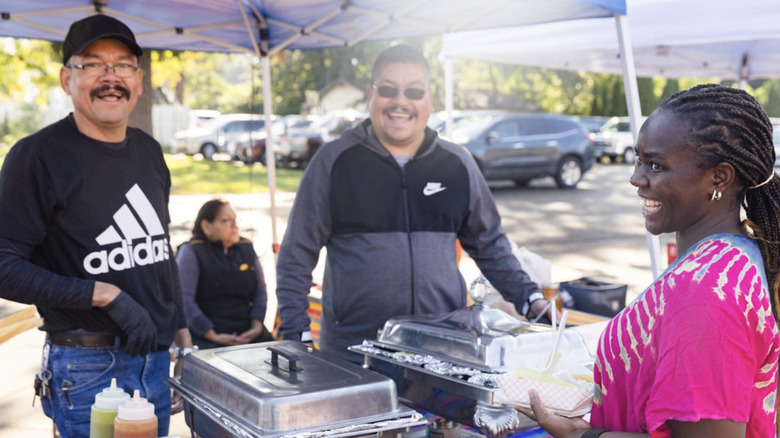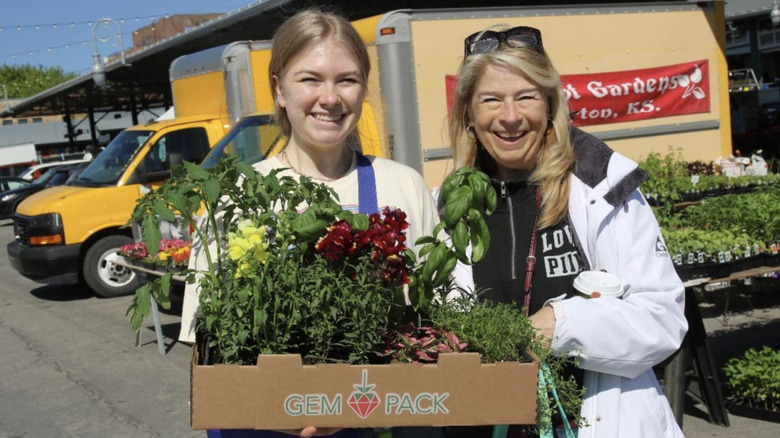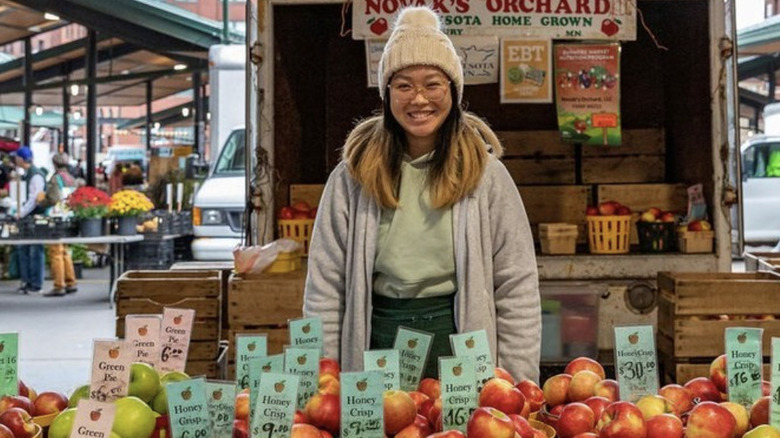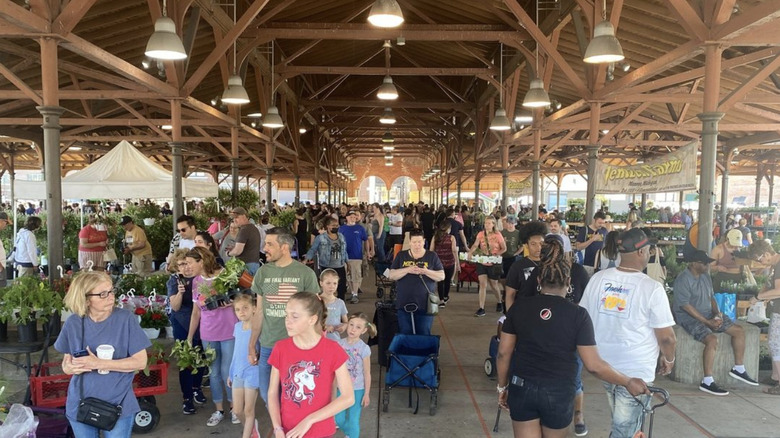13 Best Farmers Markets In The Midwest
Is there anything better than farmers market season? Spring and summer afternoons are spent wandering open-air venues flanked by local farmers and small producers showcasing their wares — rain or shine (it beats pushing a clattering shopping cart down the Trader Joe's freezer aisle any day).
Though we are lucky to find wonderful farmers markets all across the country, they're notably special in the Midwest. This comes as no surprise, given the region's stellar reputation for agriculture. Think market stalls bursting with juicy stone fruits like cherries, lefty cabbages, and buttery-centered Yukon gold potatoes. And of course, we can't forget about the booming local cheese culture — do yourself a favor and scoop up a wedge of Wisconsin cheddar with your produce and pair it with some local honey and preserves.
All that said, we've curated a list of our favorite farmers markets across the Midwest to help guide you on your mission to shop locally, covering some beloved spots in major cities and hidden gems alike. So grab your favorite tote bag and go live your farmers market fantasy.
Low-Line Market
You might not think to look for a perfectly curated farmers market underneath a train station, but Chicago's Low-Line Market is a tucked-away paradise for area artisans to hock their wares and neighbors to mix and mingle. One of the only farmers markets in the Lakeview neighborhood, it's truly a hub during the summer and early autumn months, open seven days a week from 3 p.m. to 7 p.m. and running from June 6 to October 10 in 2023.
"By providing an increased availability of local food sources within walking distance of a high-traffic residential area, the Low-Line Market aims to contribute to an increase in sustainability within the local community," Julie Star, engagement manager at the Lakeview Roscoe Village Chamber of Commerce, told Block Club Chicago. This season, expect an array of vendors that go beyond just produce, though the greens shouldn't be slept on, with offerings from modern growers like Kaleido Greens — a vertical micro-farm that grows microgreens, herbs, and colorful edible flowers – and beloved stalwarts such as Kugel Farms, a multigenerational, family-owned farm that has been supplying the area with top-notch fruits and veggies for over 100 years.
You'll also be able to grab some vegan hot sauce from Spicy Grrrls as well as some small-batch pickles from Pickled Prince. Don't forget to tuck a loaf of crusty sourdough from the woman and minority-owned 1902 into your basket and a bouquet of sustainably grown blooms from Flying Penguin Farm. When you're all set with your shopping, you can kick back and enjoy some live music or get some culinary inspiration during a live cooking demonstration.
Green City Market
Another standout option in Chicago, Green City Market is the city's first and only year-round and sustainably focused farmers market — it's also the largest. Just because it's open all year doesn't mean it's exempt from that summer market magic, though. Green City has just one market open indoors from November to April, but when May comes around, it moves to the green space at iconic Lincoln Park and pops up in a second location in the West Loop neighborhood.
On Wednesdays and Saturdays, Chicagoans walk shoulder-to-shoulder to peruse the stalls, sipping on healthy elixirs from vendors like Earth + Skyke Farm and (new for 2023) snacking on gourmet charcuterie cones from Flock and Forage, which will handcraft each daily with ingredients procured from fellow market purveyors (think artisanal honey, homemade chips, etc.).
Other exciting options for this year will include fancy fungi from Windy City Mushroom as well as Kajer Greens, which offers killer root veggies and other farm-to-table goodies. No matter what you choose to stock your bag with, though, you know you're supporting the local economy and probably getting a much better bang for your buck on quality food given the supermarket prices these days.
Broad Ripple Farmers Market
This Indiana farmers market has a cult-like following, and we can see why. The Indianapolis-based Broad Ripple Farmers Market has some serious stipulations on who they allow in as purveyors. First off, they only allow food vendors to set up a booth, so you won't find crafts or art here, just plenty of dinner inspiration. Every single producer present at the market must grow, raise or make their goods locally and all have to be licensed with the local health department (phew!).
Any fresh goods like meat, poultry, or produce must be grown directly by the farmer manning the booth, with priority given to farms that use humane and sustainable production methods. Pantry goods and similar sundries made from local ingredients are given priority as well. They also stay away from repeat vendors, too, so if you see someone selling honey at Broad Ripple, you know it's the best of the best to secure that single coveted spot.
The market is open all year, moving from an indoor to an outdoor location for the summer season. This year, the outdoor market is setting up shop in a Lowe's parking lot, so — if you're inspired to pick up some supplies to build your own backyard garden after seeing the bounty of fresh fruits and veggies at Broad Ripple — you can do so ASAP.
Ann Arbor Farmers Market
Ann Arbor, Michigan is known for being equal parts cool and quaint, so it's no surprise that they play host to one of the best farmers markets in the Midwest. This producer-centric market is over 100 years old and sets up shop eight months out of the year from May to December. It's the second-oldest continuously operating market in Michigan, too, so you can trust that the folks here know where the good stuff grows.
Accolades aside, there's so much to see and experience here. Around 120 vendors come to sell everything from the edible to the wearable, old and new. Highlights include produce from Tantré Farm, a couple-owned must-visit for raspberries and winter radishes that uses organic methods to grow on 115 acres of fields, woods, and wetlands. Also not to be missed is Cafe Japon, where owner Miyoko Homna has spent over a decade crafting pastries marrying techniques from France and Japan (and also mastering the perfect crunchy-outer-soft-center baguette).
Haymarket Farmers Market
Lincoln, Nebraska's Haymarket Farmers Market is the perfect place to start your day. Open from 8 a.m. to Noon every day from May to October, Haymarket hosts plenty of purveyors and features live music from jazz and swing ensembles. Vendors fall into three categories: produce, food, and arts & crafts — all of which are hand-grown and hand-made by the same folks who are selling them to you (and you can count on some pretty unique goods since farmers and craftspeople come from all across the state to sell at Haymarket).
A typical morning there might look something like this: You meander over to the downtown Lincoln area, beckoned by the sound of laughter and the "oohs" and "ahhs" of locals admiring ripe fruits and intricate artworks. You smell some sizzling churros or freshly baked kolaches and grab a few to snack on as you stroll. Maybe you scoop up a coffee, too, to sip as you select some ripe melons and fresh greens to take home. When your legs need a break, you take a seat in Iron Horse Park to enjoy the musical stylings of groups like Swing Fever — or bust a move if that coffee is kicking in.
Worthington Farmers Market
What began as a Sustainable Agriculture Ph.D. dissertation project between two friends is now a bustling farmers market that's at the hub of the Worthington, Ohio community. The market is managed by volunteers from the greater Columbus area and takes place all year, but there's something so special about the summer season market, which sets up shop in a quaint historic district.
What you'll find: upwards of 70 purveyors showing off their wares every Saturday (and lots of folks taking their dogs along for the shopping trip). The typical fresh produce is, of course, a highlight, but those looking for something a little more indulgent can nosh on doughnuts and other sweet treats. Patrons can also put down their tote bags and groove to live music, bend and stretch their way through a yoga class, and feel good about where their food scraps go with the on-site compost exchange program. There are plenty of cooking classes and cooking demonstrations, too, so you'll know exactly what to do with that ripe eggplant you just snagged.
Soulard Farmers Market
We love the classic "tent maze" feel of a typical outdoor farmers market as much as the next cooking enthusiast, but picking up a head of crunchy romaine under the roof of an open-air, "grand hall" with Italian Renaissance architecture sounds fancy and fun. There are 147 stalls for local vendors to show off everything from homemade jambalaya, handmade soaps, sweet corn, and an entire booth devoted to just really nice bamboo plants. That said, Soulard is also a great spot to go if you're looking to go beyond the garden with what you're looking to buy.
Another market that's open year-round, Soulard is also one the nation's oldest, hearkening back to a local market that set up shop in 1779. And it's proven to be a popular spot for all of those years, too. You'll find the biggest crowds on Saturdays, so shop on Wednesday or Thursday for a slower pace.
Oshkosh Farmers Market
This fun Wisconsin event has made the Daily Meal's list of the best farmers markets in America five times, so you know it's worth a visit. The Oshkosh Farmers Market runs all year (except for May), with summer being the biggest iteration with over 130 vendors, selling their wares rain or shine from June to October.
The star here is the seasonal Wisconsin-grown fruits and veggies (the market's website even has a handy guide that goes by month). June brings spears of tender asparagus as well as rosy beets, strawberries, and rhubarb, while July adds sweet corn, summer squash, okra, and kohlrabi to the mix. And in late summer, you'll see heartier squashes, apples, and hearty brassicas come into play. And if you're shopping for fat and juicy tomatoes (as we so often are on our farmers market trips), you'll find them in July, August, and September. Because we all know finding the perfect summer tomato for a simple sandwich is what it's all about.
Dane County Farmers Market
Another stand-out in Wisconsin, the Madison-based Dane County Farmers Market is the largest producer-only farmers market in the country. Think of a rotating selection of over 250 vendors, with at least 150 showing up every Saturday with their farm-fresh and artisanal offerings. Though there are so many stalls to explore, definitely make time to chat with the farmers and food makers. They're super knowledgeable and incredibly passionate since these are the folks who are actually doing the making, baking, and growing to get these goodies to your table. And they can definitely tell you the difference between an English cucumber and a standard cucumber if you're more of a veggie novice.
Another pro tip: Get there early to avoid sellouts. Remember, these are small operations that can only produce and transport a certain amount of goods at a time, so if you have your heart set on some fancy mushrooms for this evening's risotto, aim to visit before 9 a.m. in the morning.
Global Greens
It always feels good to frequent the farmers market — whether your aim is to support local agriculture, buy produce with less wasteful packaging or simply get some fresh air during your grocery run. But Global Greens, based in Des Moines, Iowa, has an extra special mission. The market is composed entirely of former refugees who are using sustainable farming to establish small businesses and connect with the community.
Given this global perspective, you'll find fruits and veggies that aren't as common in your typical Midwestern farmers market. You can grab lightly bitter African eggplant to try raw or simmer until tender with stewy tomatoes, or try your hand at cooking up some long beans — a favorite in Southeast Asian cuisines — as the star of a flavorful curry dish. So not only can you feel good about your food budget going towards the community, but you can expand your palate while you're at it.
City Market
Kansas City, Missouri's City Market has a lively feel that makes you excited to shop for dinner, which is no surprise, given its rich history as a hub for everything from horse trading to circuses, to rallies beginning in 1857. But even though there's lots to take in and a large number of different market stalls, that doesn't mean the vetting process for vendors is any less strict.
Every participating farmer must grow their own produce within a 500-mile distance of City Market and a representative visits each and every farm to verify, so you know you're really getting local produce. Every artist and craftsperson gets a workshop visit, too, to ensure quality and best practices before they're allowed to sell their wares. Even buskers are required to audition, which is music to our ears. And this year, expect some cool newcomers to the market, like an outpost of Missouri Wines pouring award-winning vintages from various vineyards produced right in the state.
St. Paul Farmers Market
This Minnesota farmers market is technically a network of 18 individual markets, spanning five counties in the greater St. Paul area. So basically, you're bound to run into some fantastic local produce no matter where you are in the city, no matter what time of year it is. And by local, we mean fruits and veggies planted a maximum of 100 miles outside the city.
It's also the longest-running farmers market in the entire state, peddling produce since 1854. The wares are a little different in the modern day, though. Now, you can scoop up a bundle of tart rhubarb alongside some Vietnamese spring rolls and fragrant herb plants you can tote home to grow in your own backyard garden. And the final fun fact to show the market's long-standing legitimacy: the market is literally older than the state of Minnesota, which was officially established in 1858. Color us convinced.
Eastern Market
The Eastern Market feels a lot like its Detroit location: cool, eclectic, and vibrant. Over 40,000 folks gather every Tuesday, Saturday, and Sunday to shop locally from upwards of 225 vendors. Navigating the crowds is worth it, though, since you can scoop up everything you need for the perfect dinner party in one fell swoop. Case in point: purchase your produce and proteins alongside some unique artisanal pottery tableware to serve it in and a bouquet of blooms from a local florist to add more color to your table.
Plus, the market also hosts many additional events and specialty markets – like a vintage-packed flea market, a burger cook-off, and holiday festivals for Juneteenth. A local favorite: the Flower Day events, where 15 acres of blossoms splash color across the city. It draws a crowd of 150,000 people and plenty of growers from out of state since it's the largest open-air flowerbed market event of the year.
